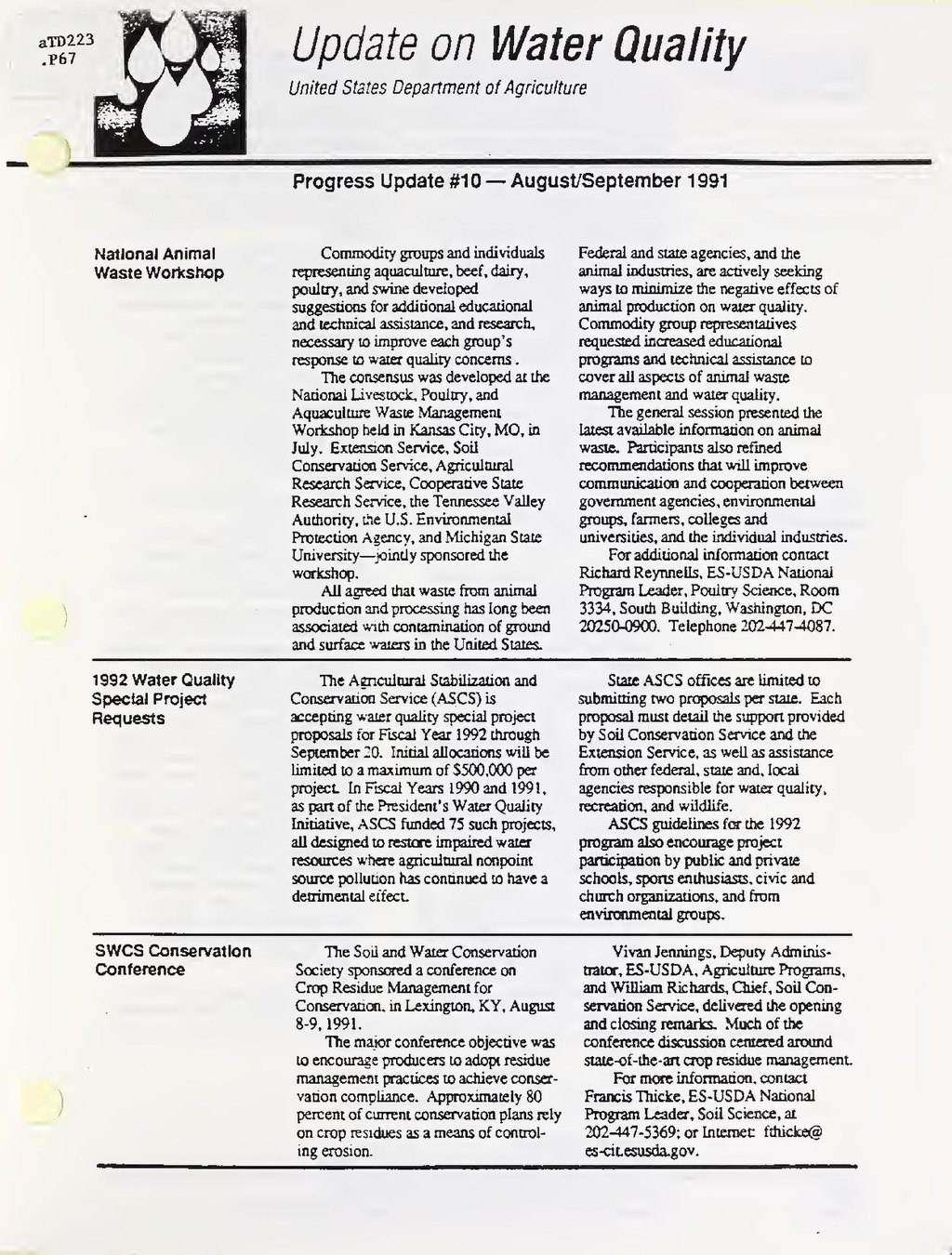 |
Update on Water Quality United States Department of Agriculture |
Progress Update #10—August/September 1991
- National Animal Waste Workshop
Commodity groups and individuals representing aquaculture, beef, dairy, poultry, and swine developed suggestions for additional educational and technical assistance, and research, necessary to improve each group’s response to water quality concerns.
The consensus was developed at the National Livestock, Poultry, and Aquaculture Waste Management Workshop held in Kansas City, MO, in July. Extension Service, Soil Conservation Service, Agricultural Research Service, Cooperative State Research Service, the Tennessee Valley Authority, the U.S. Environmental Protection Agency, and Michigan State University—jointly sponsored the workshop.
All agreed that waste from animal production and processing has long been associated with contamination of ground and surface waters in the United States. Federal and state agencies, and the animal industries, are actively seeking ways to minimize the negative effects of animal production on water quality. Commodity group representatives requested increased educational programs and technical assistance to cover all aspects of animal waste management and water quality.
The general session presented the latest available information on animal waste. Participants also refined recommendations that will improve communication and cooperation between government agencies, environmental groups, farmers, colleges and universities, and the individual industries.
For additional information contact Richard Reynnells, ES–USDA National Program Leader, Poultry Science, Room 3334, South Building, Washington, DC 20250-0900. Telephone 202-447-4087.
- 1992 Water Quality Special Project Requests
The Agricultural Stabilization and Conservation Service (ASCS) is accepting water quality special project proposals for Fiscal Year 1992 through September 20. Initial allocations will be limited to a maximum of $500,000 per project. In Fiscal Years 1990 and 1991, as part of the President’s Water Quality Initiative, ASCS funded 75 such projects, all designed to restore impaired water resources where agricultural nonpoint source pollution has continued to have a detrimental effect.
State ASCS officers are limited to submitting two proposals per state. Each proposal must detail the support provided by Soil Conservation Service and the Extension Service, as well as assistance from other federal, state, and, local agencies responsible for water quality, recreation, and wildlife.
ASCS guidelines for the 1992 program also encourage project participation by public and private schools, sports enthusiasts, civic and church organizations, and from environmental groups.
- SWCS Conservation Conference
The Soil and Water Conservation Society sponsored a conference on Crop Residue Management for Conservation, in Lexingon, KY, August 8–9, 1991.
The major conference objective was to encourage producers to adopt residue management practices to achieve conservation compliance. Approximately 80 percent of current conservation plans rely on crop residues as a means of controling erosion.
Vivan Jennings, Deputy Administrator, ES–USDA, Agriculture Programs, and William Richards, Chief, Soil Conservation Service, delivered the opening and closing remarks. Much of the conference discussion centered around state-of-the-art crop residue management.
For more information, contact Francis Thicke, ES–USDA National Program Leader, Soil Science, at 202-447-5369; or Internet: fthicke![]() es-cit.esusda.gov.
es-cit.esusda.gov.
